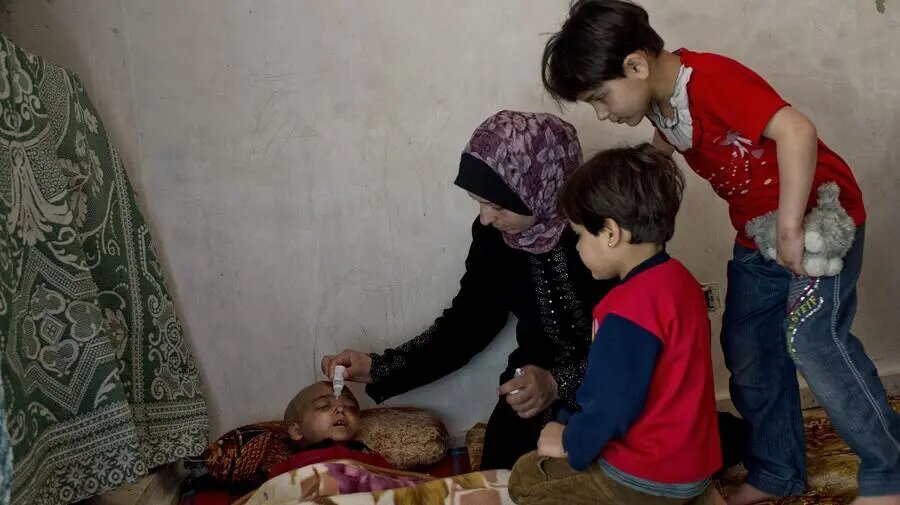Syrian humanitarians told Doha News that three-to-five people are diagnosed with cancer in northern Syria on a daily basis.
Qatar Red Crescent Society launched the ‘Hope for Cure’ campaign on Sunday in response to the growing plight of thousands of cancer patients in northern Syria, including refugees and internally displaced persons.
QRCS has placed a financial goal of QAR 5,060,000 (around $1,389,728), an amount which it said is sufficient to provide treatment for 220 Syrian refugees and IDP’s for an entire year.
The Qatari entity, together with the Idlib Governorate Hospital’s Oncology Center, is set to provide chemotherapy and immunotherapy medications to the targeted communities.
“For many years now, millions of Syrians have been displaced by the civil war. The brunt of the crisis was taken the most by cancer patients, who are desperate for intensive treatment, as well as financial and moral support, to survive such a deadly monster,” Dr. Mohamed Ibrahim, Director of Relief and International Development Division at QRCS, said in a press release.
The Syrian American Medical Society (SAMS) is providing QRCS with the lists of medicines and equipment required for treatment and diagnosis in addition to the patients’ medical reports.
The Idlib Directorate of Health in addition to local and international organisations are “conducting studies and surveys on the current situation of the health sector in northern Syria.”
The Qatari entity said it has already allocated QAR 3,641,000 (or $1 million) “to procure quantities of medicines, diagnostic and therapeutic equipment as soon as possible”.
QRCS also called on the public to support the campaign by either donating through its website, dialing its donor service or home donation collection number.
Growing concern
The campaign comes amid growing concern for cancer patients in northern Syria who are suffering from what activists have described as an “indirect effect” of the crisis caused by the Bashar Al Assad regime.
There are more than three million cancer patients in northwestern Syria alone, with an average of 1,100 new cases being discovered annually, QRCS said.
Atef Nanoua, co-founder and current CEO of Molham Team, told Doha News that five-to-three new cancer patients in northern Syria are diagnosed on a daily basis though they face a lack of access to health centres that are equipped to provide efficient treatment.
“There aren’t enough cancer centres for treatment. If there are centres within the hospitals, they are not subsidised to secure expensive cancer doses and the patients are forced to buy them from pharmacies at high prices,” Nanoua told Doha News on Monday.
Molham is a volunteer-powered humanitarian organisation that aims to support Syrian refugees and IDP’s. The organisation has been at the forefront of a recent campaign by Syrian activists and humanitarian entities demanding the provision of urgent treatment for cancer patients.
Last month, the campaign successfully pressed Turkish authorities to open the Bab Al-Hawa border crossing to thousands of cancer patients following a months-long ban.
Notably, Turkiye hosts the largest number of refugees worldwide, including some 3.6 million registered Syrian refugees who have been forced to flee violence by the Assad regime since 2011.
In February, tragic earthquakes that struck Turkiye and Syria further compounded the dire situation of Syrian refugees and IDP’s, especially those suffering from conditions such as cancer.
“Patients are usually transferred to Turkiye due to the lack of radiology devices in northern Syria for several reasons, including the prices of these devices, the lack of specialists, obtaining approval from Turkiye or the United states to enter such devices that are classified as dangerous,” the CEO explained.
According to Nanoua, there are additional costs that cancer patients coming from northern Syria are required to pay, including rent for temporary places of residence in Turkiye as well as allowance for the duration of their treatment period.
“While the treatment in Turkiye is only free in terms of radiation and medications, it is not free of charge in terms of imagery and medical tests,” Nanoua added.
The Syrian humanitarian highlighted an underreported aspect of the struggles of cancer patients. Nanoua said children diagnosed with cancer often end up receiving treatment in Turkiye alone without a guardian due to entry restrictions.
“Children aged eight or above are not allowed to enter Turkiye with a guardian. We know that patients are in need of a companion. So the child would leave [northern Syria] alone without a companion and go to hospitals alone,” Nanoua said.
Last month, the Brigham and Women’s Hospital published the findings of a decade-long study that documented cancer cases among Syrian refugees.
According to the American hospital, patients were made to apply for treatment funds from the United Nations High Commission for Refugees (UNHCR). However, many refugees with advanced cancer stages “were considered to have poor odds for survival, and, therefore, denied care”.
“Many of these refugees did not have access to early cancer detection. They were diagnosed late, and they were not going to receive care because of it,” Aditi Hazra, a genomic epidemiologist and assistant professor in the Brigham’s Division of Preventive Medicine, said last month.
Hazra added: “That seemed at odds with the idea of health as a human right.”







